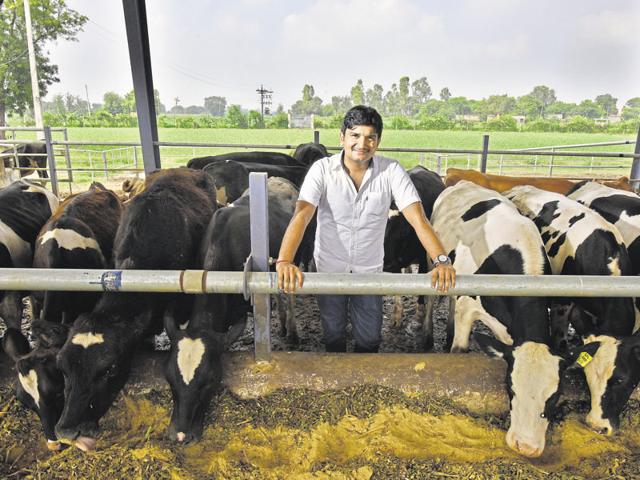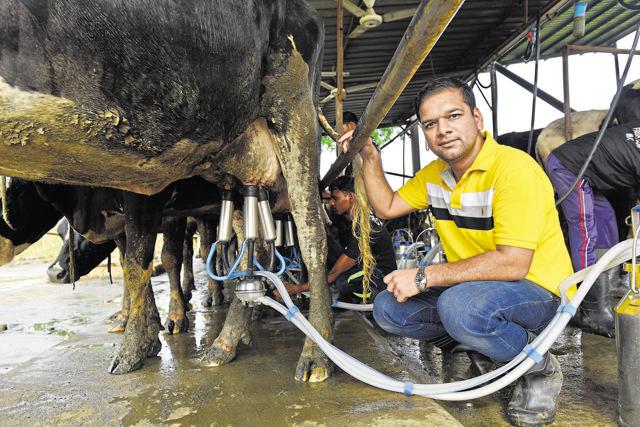Delhi’s new cowboys: Engineering a new milk revolution
Many farm-to-table integrated dairy farms have come up in Delhi-NCR with their own cows, milk parlours, processing units and farmland to grow fodder for animals.
Vaibhav Agarwal loves to talk about cows. He proudly says he can identify the breed of a cow, its age and lactation cycle from a distance. Agarwal is not a cowboy, or a cow vigilante. He is a management graduate who co-founded a dairy farm with his brother Chirag, a software engineer educated in the US.

The Agarwal brothers belong to a new breed of milkmen — mostly management professionals and engineers — leading a new milk revolution in India. At their nine-acre farm, O’ Leche, in Kuchesar, Uttar Pradesh, about an hour drive from Delhi, the brothers are often seen pampering their cows — about 200 of the Holstein Friesian breed. Vaibhav says he supplies milk ‘as pure as organic’ to 2,000 families in Delhi and its adjoining towns.
Delhi-NCR, which consumes 18 lakh litres of milk every day, is becoming a hub of modern, integrated dairy farms with their own cows, modern cowsheds with fans and sprinklers, milk parlours, vet clinic and milk-processing facilities.
“There is adulterated milk in the market. We wanted to provide people pure, farm-fresh milk. Besides, I get to spend time in a rural area, away from Delhi’s pollution,” says Vaibhav, 32, sitting at his farm, with cows mooing in the background.
The region has many other dairy farms run by engineers and management professionals, many of whom quit their plush jobs to become milkmen.
“Sixty per cent of people who approach me for setting up dairy farms are engineers and management professionals in their early and mid-thirties,” says Kuldeep Sharma, who runs Suruchi Consultants, one of the oldest dairy farm consulting firms. He organises dairy entrepreneurship development programmes across the country.
Delhi-based IIM graduate Chakradhar Gade gave up his investment banking job in 2013 to start a dairy farm at Sabrana near Sultanpur with 50 cows. Two years ago, he tied up with local dairy farms in Bhiwani, Rajasthan, and installed cold chains, milk-testing machines and chilling equipment.
“I felt there was a big opportunity in this sector. I went door-to-door in Gurgaon to conduct a survey, and found a lot of residents complaining of adulterated or diluted milk. They were willing to pay more for premium milk,” says Gade, 32. His brand Country Delight caters to 3,500 families. “Most of our customers are young professionals.”
He sees a great future and rapid growth for his brand as people’s quest for pure milk is rising. According to a Food Safety and Standards Authority of India (FSSAI) survey, 68% of milk in India is adulterated. And 70% of the Capital’s milk samples were contaminated. Water was the most common adulterant.
Pankaj Navani, a computer engineer, set up Binsar farm in Janti Khurd village in Haryana’s Sonepat with his two engineer friends — Deepak and Sukhinder.
“We knew next to nothing about dairy farming. We had to learn about nutrition, how fodder and animal behaviour change through seasons. We started with 50 heifers instead of milk cow so that we could understand as much as possible about the animals’ growth,” says Deepak. He quit his job as an engineer with a multinational computer technology company.
“We learnt from our co-founder from New Zealand that green fodder is key to the good health of animals.”
Binsar harvests around 80 acres of land with fodder crops of maize, rye, grass, etc. “We wanted to feed more natural greens to our cattle,” says Deepak.

The Binsar farm, spread over 10.5 acres, has over 300 cows in sheds that have huge fans and sprinklers to wash them. There is a milk-processing unit. The farm produces 3,500 litres supplied in areas such as Rohini, Pitampura, Patparganj and Indirapuram. The milk of these new integrated farms costs `65 per litre, while branded pouched full cream milk costs Rs 49 a litre.
Sharma says many of these young dairy entrepreneurs have lived abroad and exposed to dairy farming practices and they want to replicate them in India. “They are good at marketing and leveraging technology for their business,” says Sharma.
Country Fresh, for example, has an app to schedule delivery of milk and make payment. Fifty percent of Country Fresh’s orders come through the app and the age-group of its customers is 25 to 40 years. “The app makes managing your subscription quite convenient as an order can be placed, cancelled, and changed at the tap of your finger,” says Gade.
Those buying milk from these dairies say they do not know if the packaged milk they consumed earlier was of cow, buffalo, goat or mixed. “I prefer cow milk for my children. It is easy to digest and has more nutritive value. Packaged milk does not provide me that option,” says Aditya Gupta, who recently subscribed to one of the many new-age dairy farms.
Rekha Sharma, former chief nutritionist, AIIMS, says adulterated milk can lead to a host of health problems depending on the nature of impurities. “If milk is adulterated with contaminated water it can lead to many water-borne diseases... Water also reduces milk’s nutritional value. The government should spread awareness about adulteration. It is not enough to do so only during Diwali. It should strictly implement food adulteration laws,” she says.




